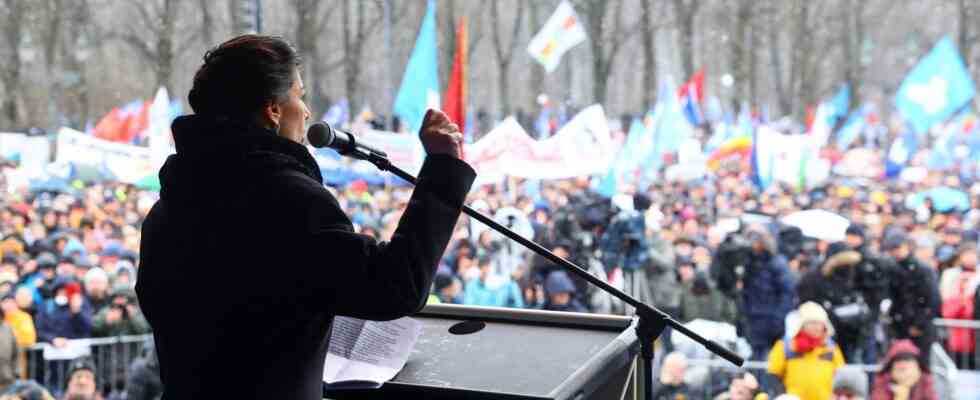analysis
Status: 02/28/2023 08:10 a.m
The centrist parties find it difficult to deal with the skeptics about arms deliveries. German society is divided on the question of how Ukraine should be supported. The political fringes want to take advantage of this.
One thing unites the participants in the so-called peace demonstration that took place in Berlin over the weekend: they want the war in Europe to end. You have to talk to each other, says one participant. Violence would only produce more violence. Many of the estimated 13,000 people who followed the call by left-wing politician Sahra Wagenknecht and publicist Alice Schwarzer to the Brandenburg Gate might think like this demonstrator.
Alice Schwarzer paints a rather gloomy picture in her version of a peace speech. One cannot defeat this nuclear power, meaning Russia. If you believe that, she continues, it could mean the end of our world. It’s sentences like these that resonate with the audience. People from all over Germany made their way to Berlin to demonstrate against the course taken by the federal government. It is striking that there are few young people.
Wagenknecht has recognized the potential of gun skepticism
Only organizations from the political fringes, from the left and from the right, called for the demonstration. Many millions of Germans are skeptical about arms deliveries to Ukraine. Much more than those who would associate themselves with the left or the AfD. According to current ARD Germany trend 43 percent recently spoke out against the delivery of battle tanks – in the east even almost 60 percent.
“Since when has the call for peace been right?” calls Sahra Wagenknecht into the microphone. It is probably the best-known leftist in Germany. At the same time the least popular in their own ranks. Wagenknecht has recognized the potential of skepticism about weapons and uses it to his advantage. This works, among other things, because the parties of the center can do little with the doubters. FDP General Secretary Bijan Djir-Sarai makes it clear that Russia is currently not interested in negotiations and describes the weekend demonstrators as naive.
“Wagenknecht has recognized the potential of gun skepticism”. Participants in a demonstration for negotiations with Russia on February 25 in Berlin.
Image: dpa
Logic of war and violence?
The fear of an escalation of the war is not only represented on the political fringes. Saxony’s CDU prime minister, Michael Kretschmer, regrets the lack of diplomatic initiatives and condemns what is literally a “logic of war and violence”.
His party colleague Roderich Kiesewetter, foreign politician of the Union parliamentary group and a clear critic of the Schwarzer Wagenknecht initiative, expressed himself differently. Kiesewetter warns against no longer supporting Ukraine. This step could encourage other countries to act as aggressively as Russia. When he says that, he thinks of Iran or China with regard to Taiwan. This is one of the reasons why he wrote a reply to Wagenknecht’s manifesto. He wants to make his contribution to the debate and not drive the skeptics further to the political fringes.
By no means only extremes and Putin understanders
Protest researchers are now warning against denigrating the possibly unrealistic, but at least well-intentioned desire for a ceasefire from the outset and insinuating that they are close to Russia. This leads to a hardening of the debate. And so the SPD chairwoman Saskia Esken tries the balancing act. She has great understanding for the people who are worried that the war will continue to spread. A little later, however, she made it clear that she had no sympathy for those who would demonstrate with Russian flags and together with the far right.
Vice Chancellor Robert Habeck from the Greens made a similarly powerful statement. He tells those who follow Wagenknecht that they want peace. And accuses them of selling what an imperialist dictator wants for Europe as peace. A clear message to the demonstrators.
Around 700,000 people have signed the petition from Wagenknecht and Schwarzer so far. A look at the list of signatories makes it clear that these are by no means just extremes and people who understand Putin, but also people from the middle. Experts fear that the Russian war of aggression will continue for a long time. And so the debate about Germany’s involvement will continue. The centrist parties are clearly finding it difficult to meet the desire for peace expressed by parts of the population.
After Wagenknecht demo: who calls for peace in the middle?
Torben Ostermann, ARD Berlin, February 28, 2023 7:16 a.m

